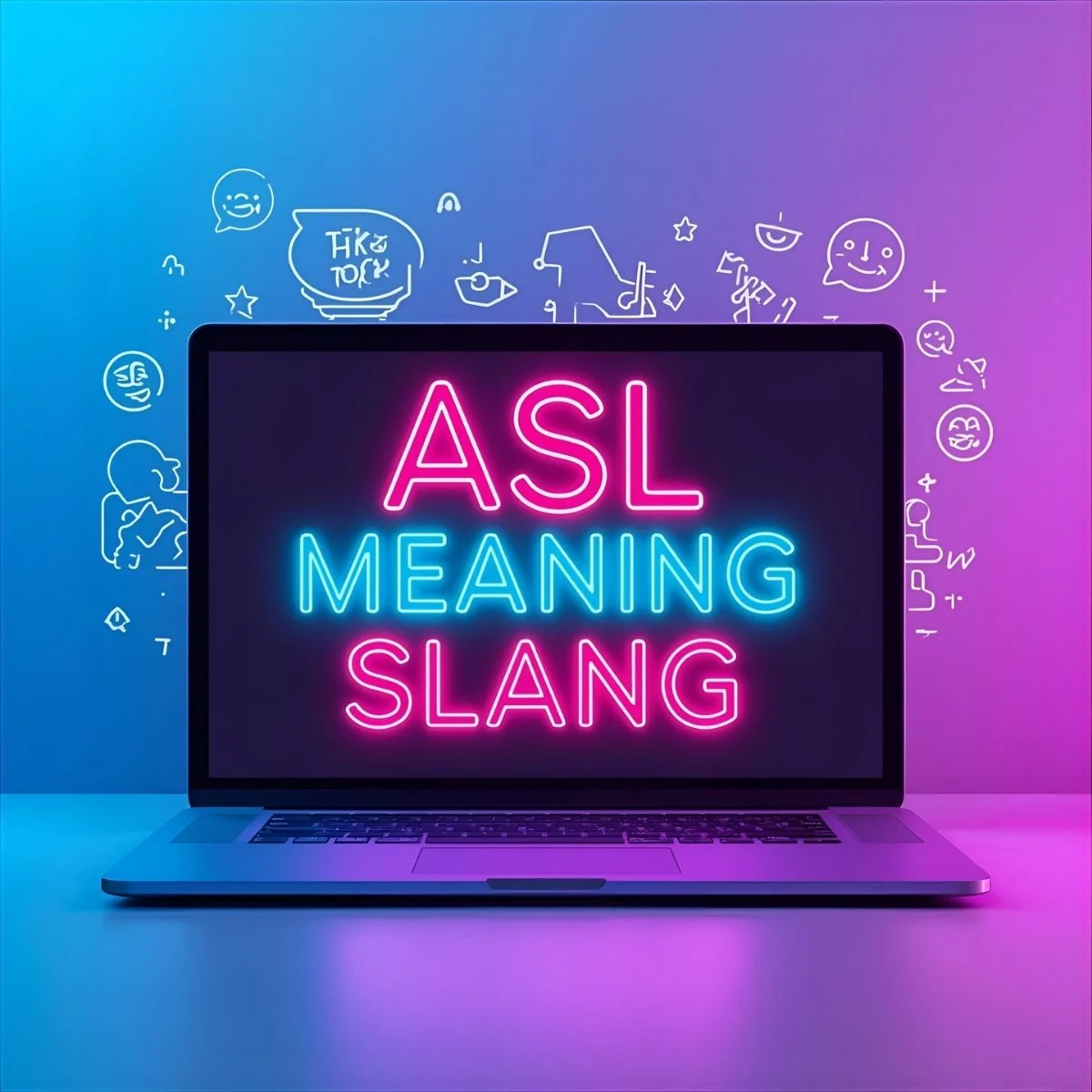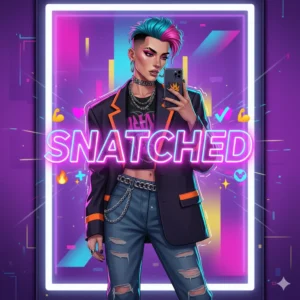If you’ve spent any time in online chatrooms, TikTok comments, or Snapchat streaks, you’ve probably come across someone asking, “ASL?”
At first glance, you might think it refers to American Sign Language, what does asl mean slang and while that’s true in one sense, in the world of internet slang it takes on an entirely different meaning.
In slang, ASL means “Age, Sex, Location” a quick way for people to get to know each other online. This abbreviation asl slang meaning has been around since the early days of internet chatrooms, long before emojis and filters dominated digital conversations.
Over the years, it has shifted from being a simple icebreaker to a humorous, nostalgic, and sometimes ironic phrase used in memes and TikTok trends.
This article dives deep into the slang meaning of ASL, explores how it’s used, compares it with its more formal definition, and explains why it still matters in today’s digital world.
What Does ASL Mean in Slang?
Asl Meaning in Chat
In internet slang, ASL stands for “Age, Sex, Location.”
It originated in the early 1990s and 2000s when chatrooms like AOL, MSN Messenger, and Yahoo Chat were popular. Back then, people often entered chatrooms anonymously, and ASL? was a quick way to figure out basic details about the stranger you were talking to.
Asl meaning in Text
What does asl mean texting
In texting, “asl” means “as hell,” a Gen Z shorthand used to intensify a feeling, reaction, or description. Instead of writing “very” or “extremely,” people type “asl,” like “I’m tired asl,” “that’s funny asl,” or “you cute asl.” It’s fast, expressive, and far more common today than the old chat-room meaning “age, sex, location,” making it the go-to way to add emphasis in modern messages and social media captions.
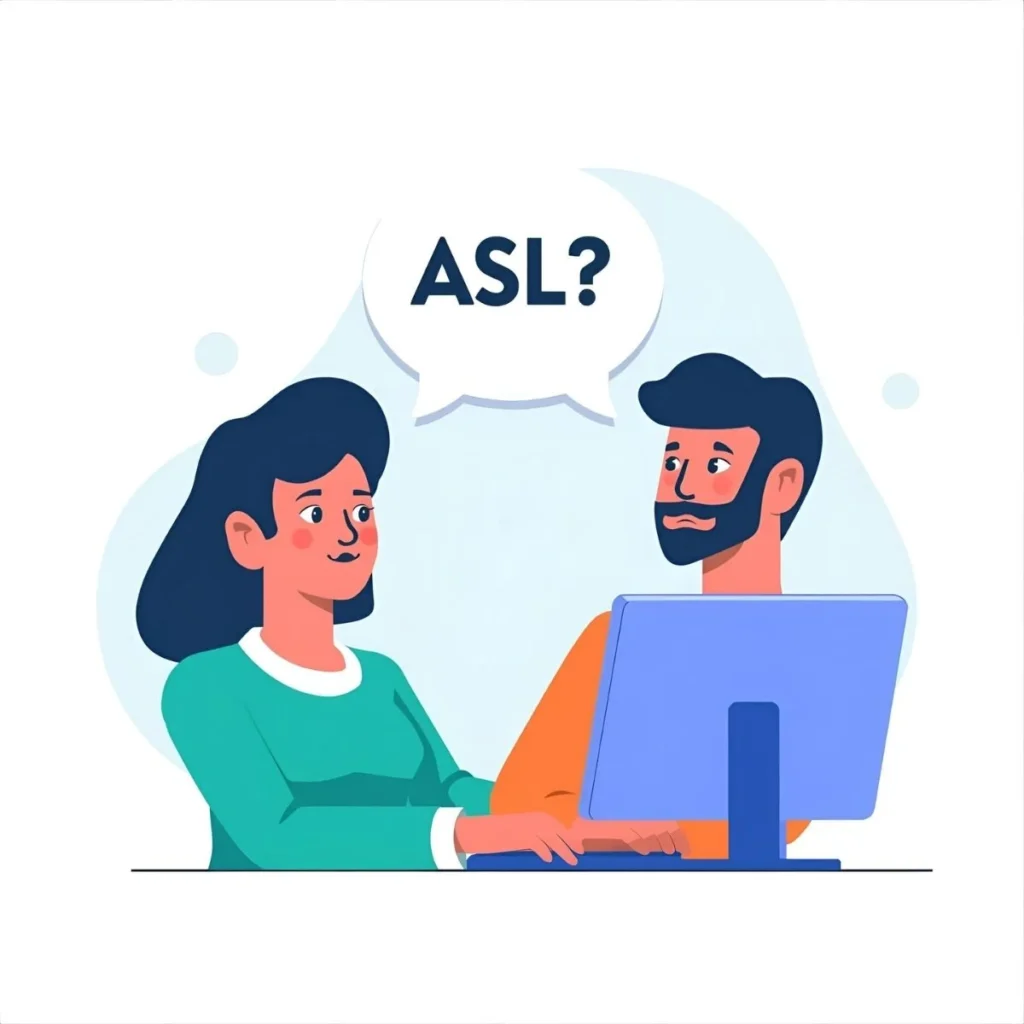
- Age → How old the person is.
- Sex → Gender (male/female, though today gender expression is more diverse).
- Location → Where they live (city, state, or country).
Essentially, ASL was the internet’s first small talk.
What does bad asl mean?
“Bad asl” is Gen Z slang that means someone or something is extremely attractive, impressive, or cool. The phrase mixes “bad”—a compliment meaning fine, gorgeous, or top-tier—with “asl,” which stands for “as hell.” Put together, “bad asl” basically means “super attractive” or “insanely good.” It’s often used in comments, TikTok captions, and Snapchat messages when someone looks stunning or does something impressive.
On TikTok and Instagram, people use “bad asl” to hype up selfies, glow-ups, outfits, or aesthetic content. Instead of saying “you look really good,” users simply comment “you bad asl 🔥.” The phrase has become popular because it’s fast to type, expressive, and fits perfectly with Gen Z’s short-form texting style. It’s also gender-neutral, so it works for anyone.
In texting, “bad asl” can be flirty, funny, or simply uplifting. Friends use it to gas each other up, while creators use it to engage audiences with relatable captions. Because slang evolves quickly, “bad asl” can also shift meaning depending on tone—sometimes it describes a person, other times a vibe, a fit check, or even a car or product that looks sleek. Overall, it’s modern internet shorthand for calling something exceptionally attractive or impressive.
Define ASL
ASL stands for either “age, sex, location” or “as hell,” depending on the context. Originally, it was a chat abbreviation used to ask someone’s basic info online. Today, especially among Gen Z, it’s more commonly used to emphasize something—like saying “fine asl” for “really attractive” or “funny asl” for “super funny.” Its meaning shifts with tone, making it one of the most versatile slang terms in modern internet language.
Asl Meaning Urban Dictionary
In slang and online chat culture, “ASL” stands for “age, sex, location.” It originated in the early days of internet chatrooms like AOL and MSN Messenger, where users used it to quickly get to know someone. For example, typing “ASL?” was a shorthand way of asking, “How old are you? What’s your gender? Where are you from?”
While the term started as a practical icebreaker, it’s now often used humorously or ironically on platforms like TikTok and Twitter to mimic old-school internet vibes or tease someone’s curiosity about personal details. In modern slang, saying “ASL?” can mean “Who are you?” or “What’s your deal?”—a playful throwback that mixes nostalgia with today’s digital humor.
ASL Full Form Slang Meaning (Used in Chat, Texting & Social Media)
ASL is a popular internet slang acronym that stands for Age, Sex, Location. It’s commonly used in online chats, texting apps, dating platforms, and social media DMs to quickly ask for basic personal information during a conversation.
Originally popular in early internet chat rooms, ASL slang is still widely recognized today—especially in casual or anonymous online interactions.
What Does ASL Mean in Slang?
In slang usage:
ASL = Age + Sex (or Gender) + Location
Instead of asking three separate questions, people use “asl?” as a shortcut.
Example:
- User 1: “Hey, nice talking to you.”
- User 2: “Yeah 😊 asl?”
This instantly asks:
- How old are you?
- Are you male or female?
- Where are you from?
Where Is ASL Slang Commonly Used?
ASL slang appears most often in:
- 💬 Online chat rooms
- 📱 Text messages
- 💘 Dating apps (Tinder, Bumble, etc.)
- 🎮 Gaming chats
- 🌐 Social media DMs
It’s especially common when:
- People are chatting anonymously
- Someone wants quick context about who they’re talking to
Is ASL Still Used Today?
Yes—but less than before.
ASL was extremely popular in the early 2000s, especially on platforms like:
- Yahoo Chat
- MSN Messenger
- AOL Instant Messenger
Today, it’s:
- Still understood by most internet users
- Used more casually or jokingly
- Sometimes seen as old-school internet slang
Many people now prefer asking questions separately or checking profiles instead.
ASL Slang Examples in Real Conversations
- “You seem cool, asl?”
- “Before we continue—asl pls”
- “Met someone in a game lobby, first thing they asked was asl 😂”
These examples show how ASL slang is used naturally in modern conversations.
Is ASL Slang Safe to Use?
While ASL is harmless on its own, users should be cautious:
- Avoid sharing personal details with strangers
- Be mindful on public or anonymous platforms
- Younger users should not respond to ASL requests from unknown adults
ASL in Internet Slang vs. ASL as American Sign Language
One reason ASL slang can confuse people is because it shares the same acronym as American Sign Language, the widely recognized language of the Deaf community. But the two meanings are worlds apart.
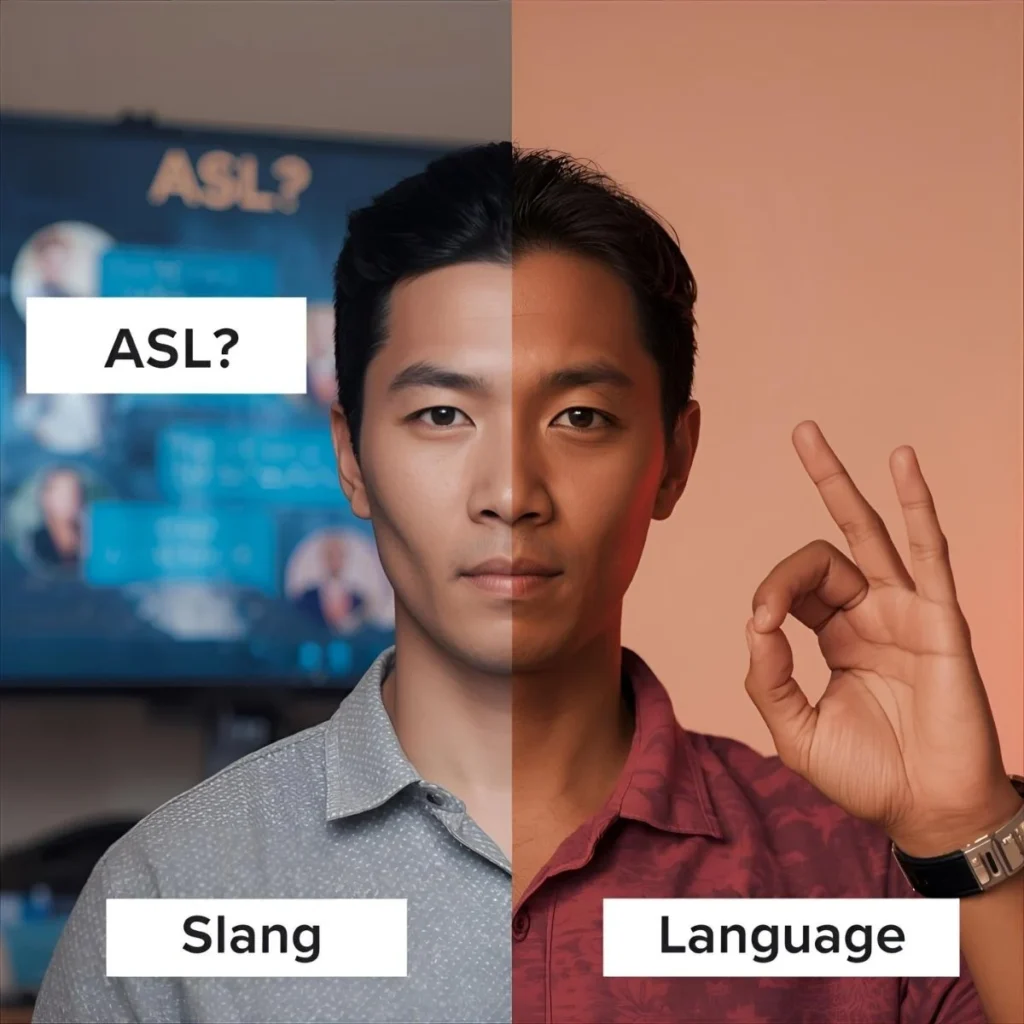
Here’s a quick breakdown:
| Term | Meaning | Context | Example Use |
|---|---|---|---|
| ASL (Slang) | Age, Sex, Location | Online chats, TikTok, memes | “Hey, what’s ur ASL?” |
| ASL (American Sign Language) | A complete natural language used by the Deaf community | Communication, education, culture | “She’s fluent in ASL.” |
Important note: The slang version is casual and often playful, while the language (ASL) is serious and respected as part of cultural identity. Mixing them up can cause confusion, especially outside internet slang conversations.
The Evolution of ASL Slang
The use of ASL as “Age, Sex, Location” has evolved over decades:
- 1990s–Early 2000s → Popular in AOL and MSN chatrooms as a genuine question.
- Late 2000s → Declined with the rise of Facebook and more public profiles.
- 2010s → Resurfaced as a nostalgic phrase in forums and memes.
- 2020s → TikTok and Twitter revived it as a humorous or ironic phrase, often used to mock oversharing or awkward introductions.
For example:
- In 2002: “ASL? 17/F/California.”
- In 2023: “Dude was oversharing… I didn’t even ask for his ASL.”
Modern Usage of ASL in Slang
Asl meaning Tiktok
Today, ASL isn’t used seriously like it was in chatrooms. Instead, it appears in a few different ways:
- Memes and TikTok Trends – People use “ASL” humorously, often to poke fun at awkward conversations.
- Irony – Saying “ASL?” jokingly in group chats to remind people of old-school internet.
- Exaggeration – Some use “ASL” to mean “as hell”, as in “I’m tired asl.” This is a separate but equally popular slang meaning.
- Online Dating Nostalgia – Sometimes people use it as a playful icebreaker on dating apps.
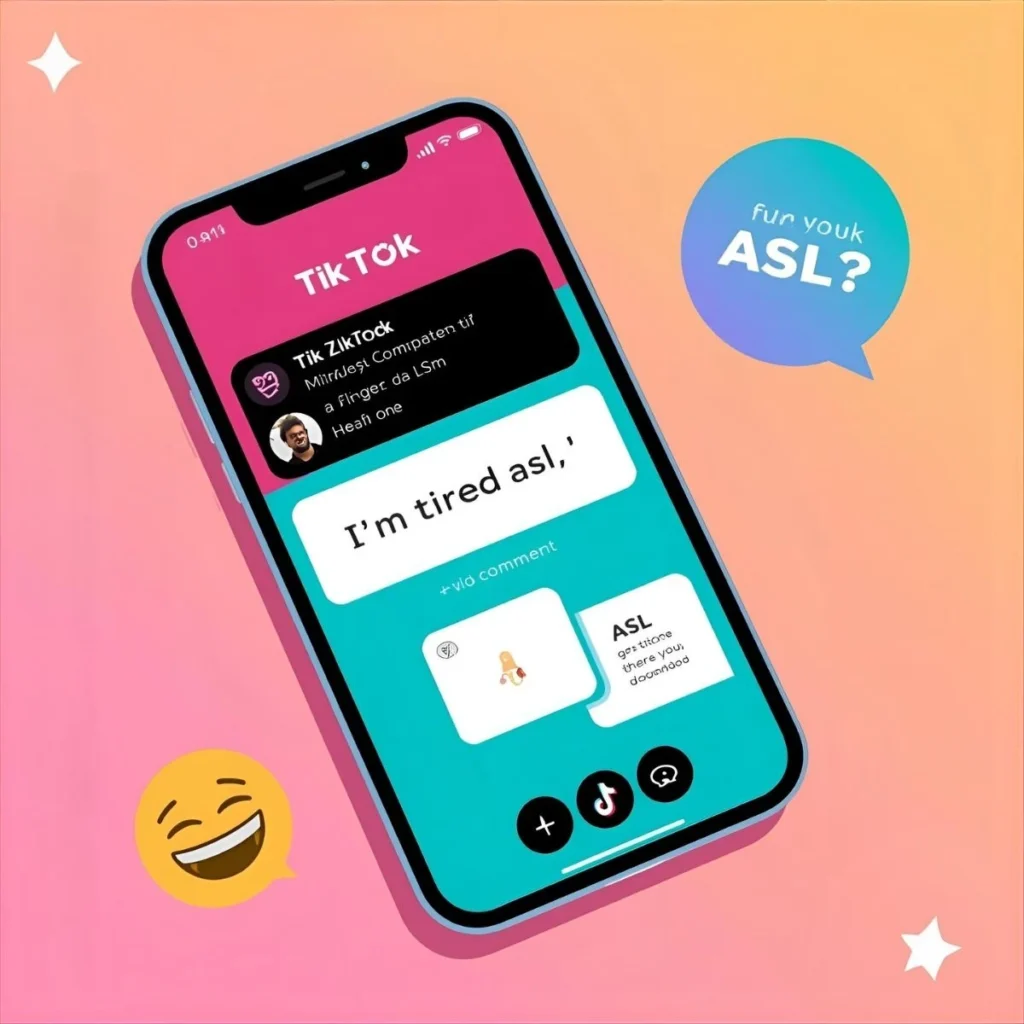
Example:
- “That party was boring asl.” (Here, “asl” = as hell).
- “He jumped into my DMs asking ASL like it’s 2001.”
🧠 What Does ASL Mean Snapchat?
If you’ve seen someone ask “asl?” on Snapchat and felt confused — you’re not alone. This short slang term might look random, but it actually carries meaning depending on the context of the chat.
Quick Answer:
On Snapchat, ASL means “Age, Sex, Location.” It’s a quick and informal way for users to ask basic details about someone, especially in a new chat or casual conversation.
It can also be used playfully in modern slang as “As hell,” depending on the tone — for example, “I’m tired asl 😩” (meaning “I’m really tired”).
In short:
👉 ASL = Age, Sex, Location — when getting to know someone.
👉 ASL = As hell — when expressing something intensely.
🔹 1. ASL Meaning (Classic Internet Slang)
Back in early internet chatrooms, “ASL” was a quick way to start a conversation and learn about someone without sounding too formal. Today, Snapchat users sometimes bring it back when chatting with new people or using the Quick Add feature.
Example:
- A: “hey, asl?”
- B: “22, F, NYC 😄”
✅ It’s casual, curious, and fits perfectly in light introductions or anonymous chats.
🔹 2. ASL Meaning (Modern Slang Twist)
In today’s texting culture, ASL also stands for “as hell”, showing exaggeration or intensity — and it’s extremely common among Gen Z users on Snapchat.
Example:
- A: “that filter’s funny asl 😂”
- B: “fr, I can’t stop laughing”
✅ It’s expressive, trendy, and fits naturally in memes, stories, and casual Snaps.
ASL Slang vs. ASL “As Hell”
Here’s where it gets even trickier. In modern slang, ASL can also mean “as hell” — used to emphasize something. This version is especially common among Gen Z on Twitter and TikTok.
| Term | Meaning | Example |
|---|---|---|
| ASL (Age, Sex, Location) | Old-school chat slang | “Hey, what’s ur ASL?” |
| ASL (As Hell) | Intensifier, exaggeration | “I’m hungry asl.” |
Both meanings exist in today’s internet culture, so context matters a lot.
ASL Meaning Slang – From “As Hell” to Gen Z Chat Vibes
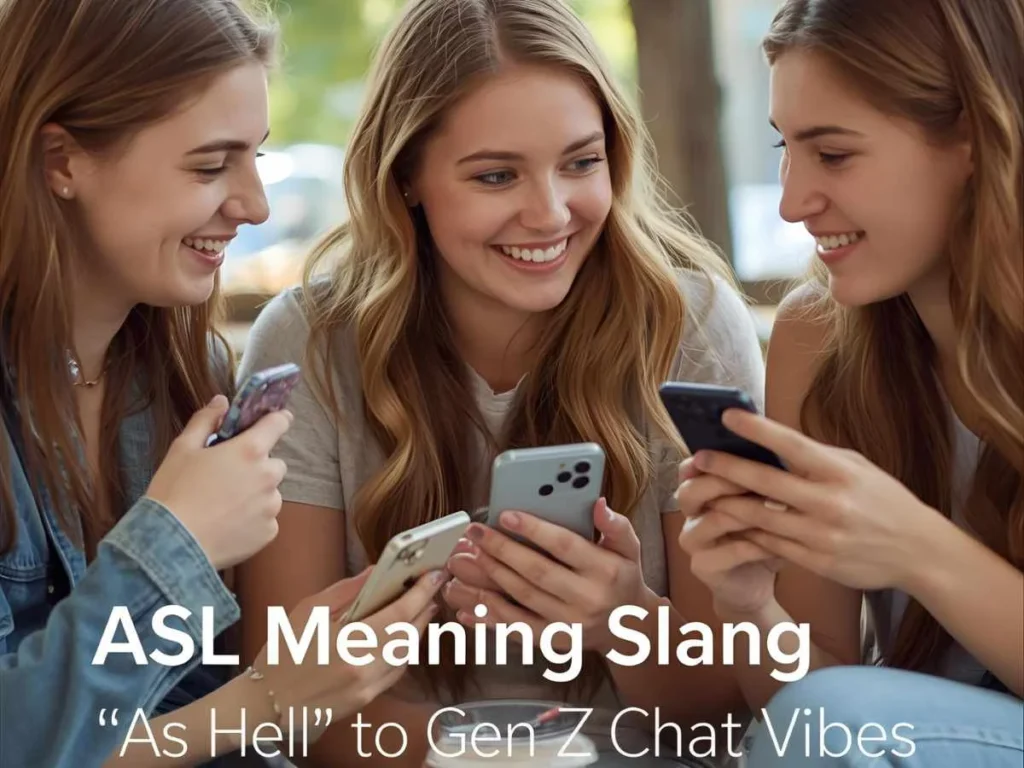
In modern slang, “ASL” isn’t just about “age, sex, location” anymore—it’s evolved into a Gen Z favorite meaning “as hell.” When someone says “fine asl,” “bad asl,” or “funny asl,” they’re simply emphasizing how strong something is—like saying “super” or “really.” For example, “She’s fine asl” means “She’s really attractive,” and “That joke was funny asl” means it was hilarious.
You’ll spot this slang everywhere, from Instagram captions to Reddit threads and group chats. Expressions like “tuff asl,” “good asl,” or “hard asl” all follow the same pattern, adding dramatic flair to emotions or compliments.
The phrase even pops up in 2019-era TikTok comments and still trends in Gen Z chat abbreviations today. Whether you say “chopped asl” to roast a bad outfit or “easy asl” to brag about a win, this term keeps online talk colorful, expressive, and effortlessly cool.
Misconceptions About ASL Slang
Because ASL has multiple meanings, people often mix them up. Here are common misconceptions:
- “ASL only means American Sign Language.” → Not true; in internet slang, it means Age, Sex, Location.
- “ASL slang is outdated.” → It’s old but still resurfaces in memes and trends.
- “ASL as ‘as hell’ is incorrect.” → Language evolves, and this use is widely accepted in casual slang.
Why ASL Slang Still Matters
Even though chatrooms are gone, ASL slang matters because it represents:
- Internet History – A snapshot of how people connected online in the early days.
- Digital Nostalgia – A throwback that reminds people of a simpler internet era.
- Evolving Language – Proof of how online slang constantly shifts meaning.
It’s more than just three letters — it’s a cultural marker in internet history.
FAQs on ASL Slang Meaning
Q1: What does ASL mean in slang?
ASL means “Age, Sex, Location,” a phrase from early internet chatrooms. It’s also sometimes used as “as hell” in modern slang.
Q2: Is ASL the same as American Sign Language?
No. American Sign Language is a formal language of the Deaf community, while ASL slang is a casual internet abbreviation.
Q: What does ASL mean in text?
Answer: In text or online chat, ASL stands for “Age, Sex, Location.” It’s often used as a quick way to get to know someone’s basic info in casual conversations or chat rooms (like “ASL?” meaning “How old are you, what’s your gender, and where are you from?”).
👉 Example:
Person 1: “Hey, ASL?”
Person 2: “22 F NY” (meaning 22 years old, female, from New York).
Q3: Do people still use ASL in chats?
Yes, but mostly in memes, TikTok, or as a joke. It’s rarely used seriously anymore.
Q4: When did ASL slang start?
It started in the 1990s during the rise of anonymous internet chatrooms.
Q5: What’s the difference between ASL slang and ASL “as hell”?
ASL slang = Age, Sex, Location.
ASL modern slang = as hell (used to exaggerate).
Q6: Is it rude to ask someone their ASL?
In chatrooms, it was normal. Today, it might feel outdated or awkward.
Conclusion
The slang meaning of ASL may have shifted, but it still plays an important role in online culture. Originally an acronym for “Age, Sex, Location” in early chatrooms, it has since evolved into a nostalgic throwback and even gained a second life as shorthand for “as hell.”
Whether you encounter it in memes, group chats, or TikTok captions, knowing the slang meaning of ASL helps you understand the humor and history behind it. Like much of internet slang, ASL shows how quickly language evolves — yet somehow manages to stick around in surprising ways.


